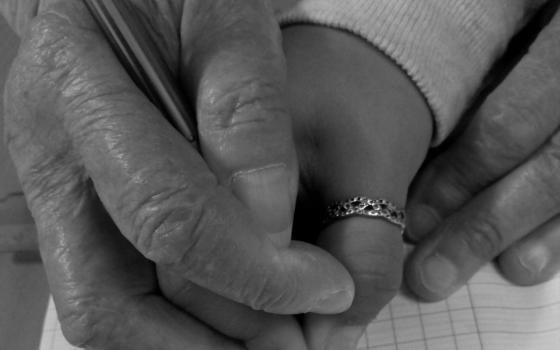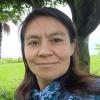"I shall give you a new heart, and put a new spirit in you; I shall remove the heart of stone from your bodies and give you a heart of flesh instead. ... You will live in the country which I gave your ancestors. You will be my people and I shall be your God" (Ezekiel 36:26, 28).
Lately, I have been thinking a lot about identity, a term that we often hear today because of what's in the news — like diverse identities, and the lack of identity. In every mission on which we are sent as women religious, our own identity receives and gives something to make all of us more human, more "sister" to each other.
For us Franciscan Missionaries of Mary, part of our charism is the "universal mission" — meaning that we may be asked to leave our country and live in international and intercultural communities. For me, this journey has been filled with beautiful possibilities for growth, because every encounter, every culture opens up our hearts to the new.
Let me explain. Last year in October, I arrived at my new mission in North Africa, in the small country of Tunisia.
After just a short time here, I have been touched by many events and new realities, and have been reflecting on the power of presence. First, I reflected that we as Christians are a minority in this country — and that in itself is a whole new powerful experience for me.
Tunisia was a French protectorate from 1881 to 1956, won its independence between 1952 and 1956, and experienced a short revolution in 2010-2011. All this, and even Tunisia's ancient history — with its different colonization and immigration movements — have made this place a country in continuous search of its own identity.
Tunisia's culture is amazingly rich; when I walk around, the beauty of the architecture catches my eye, and the art of tapestries and handicrafts is stunning.
The church has been present in Tunisia for a long time. It was in Carthage and its surroundings that St. Perpetua, St. Felicitas and their companions were martyred; we also found the place where St. Augustine began his trip after his conversion.
Living in the Maghreb region, we don't do an explicit proclamation of the Gospel; instead, we are called to be presence in the midst of our Muslim sisters and brothers. Therefore, our lives are the only means we have to proclaim the risen Jesus. Because of that, I think the presence of our elderly sisters is very meaningful: some of them have lived here since before the country's independence. They have chosen to stay in this country, with the people, through the difficult times.
Françoise, who is now 95 years old, has been a teacher all her religious life, and still teaches French to some Tunisian children. One day, I just stood in contemplation while she was teaching a girl how to write. I thought as I watched how powerful is for us to be able to walk with our people here in Tunisia, to be a quiet and discreet presence that encourages and testifies to the development of the identity of this people.
But it's not as easy as it seems. I know from studying Carl Rogers that each of us is in a self-actualization process that persistently drives us to build and rebuild our own identity. This means that each experience touches and transforms our identity in some way or another. In this sense, while the Tunisians are building and searching for their own identity, they give us the opportunity to enter the deep process of our own self-knowledge: a process intersected and intimately touched by our personal history but also by each mission, community experience and every encounter we live.
It becomes necessary to recognize not only our personal history and the history of our home country, but also the liberation journey of the people to whom we are sent — because through the rereading and interlacing of all these elements, God is leading us to grow up as God's children.
Our mission helps make us what we are ...
This process of developing our identity makes us recognize that each "belonging" — to our country, to our family, to our congregation — gives us a special way of living. But if we truly let ourselves be touched by the people to whom we are sent, this belonging is also shaped by them. This is a profound grace that makes our belonging an experience of being held in God's embrace.
In fact, for me, this experience in the midst of our Muslim brothers and sisters is leading me to deepen my relationship with our merciful God, a God who embraces, who is always present and from whom everything comes. I hear the men and women here continually saying الحمد لله (alhamd lilah), thanking God for everything. In this way, I am reclaiming every detail that has been and is molding my identity.
Maybe in the end, by our presence here we are giving the Tunisians the possibility to see themselves as in a mirror, and to continue shaping their own identity. But it's also true that we have in our hands and hearts the gifts they give us to continue embodying our own identities.
Maybe every morning, when I hear the call to the Muslim prayer, I will also hear God sweetly saying my name — a name wrought with each experience and each encounter, with a new meaning that brings me to be God's daughter in a new way.
[María de Lourdes López Munguía is a Franciscan Missionary of Mary from Mexico who now lives in Tunisia.]

